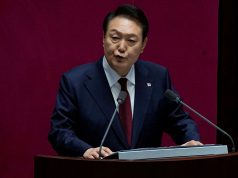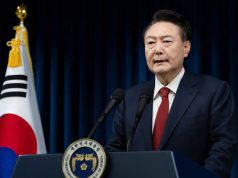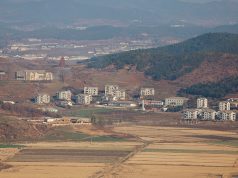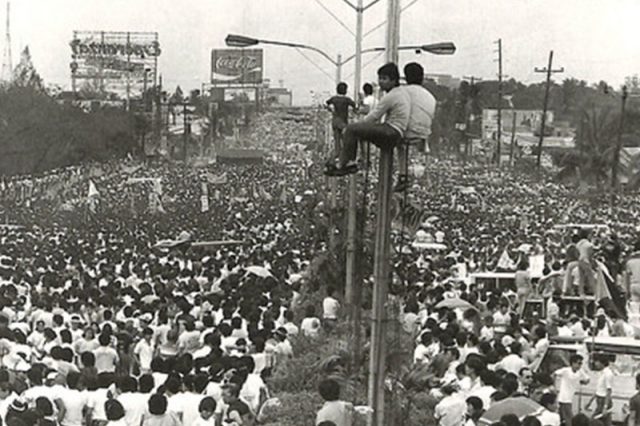
An envoy earned flak for commenting on having the only right to “look back” in response to a tweet related to the period before the historic People Power Revolution.
Teddy Locsin Jr., ambassador to the United Kingdom, on Friday responded to professor Enrico Villanueva’s comment to his post on February 24.
The ambassador initially wrote the following on Twitter:
“Sad that 37 years of anti-Marcos administrations threw away every chance that EDSA — in which I played a real part — created. Hopeless. Now, there’s hope from a president elected by the biggest landslide in democratic history anywhere, [who] is out to prove himself and vindicate his dad.”
It was a response to a comment made by former Commission on Elections chair Andy Bautista, who asked Locsin: “Are you prouder of the state of [Philippine] democracy now as compared to 1986?”
Villanueva, who was among those who read the envoy’s response to Bautista, asked Locsin: “So how is the son doing so far in undoing the damage his father did prior to EDSA?”
Villanueva was referring to President Ferdinand Marcos Jr., the son of late dictator Ferdinand Marcos Sr. who imposed a nine-year Martial Law in the Philippines.
“Go to hell. Only I have the right to look back. We lost everything in Martial Law, though we rightly supported Marcos’s reelection bid,” Locsin responded to Villanueva.
“I played a key role in Snap Election that to his credit, Marcos called, to test his mandate. A failed coup stopped vote count, never to be resumed,” the envoy added.
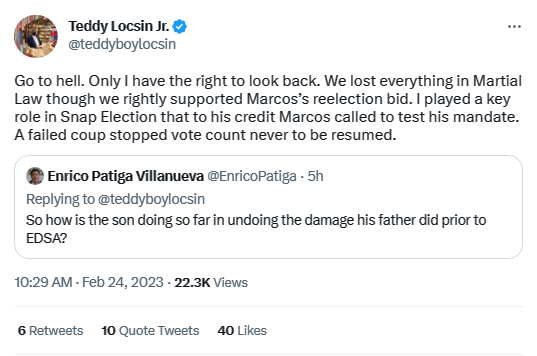
Locsin’s response to Villanueva did not sit well with some Pinoys who read the online exchange.
“Are you the Teddy Boy Locsin Jr, the speechwriter of Cory Aquino? I didn’t expect such kind of language from you,” a Twitter user said.
“Wow, may pag-aangkin ng nakaraan? Only you have the right to look back? You own the history of the Martial Law?” statistician Peter Cayton commented.
“@EnricoPatiga did not deserve such harsh words,” he added.
Others reminded Locsin that he was not the only one with harrowing experiences during the Martial Law and the period before the 1986 EDSA Revolution.
“You are not the only one suffering po,” a Twitter user said.
“[Huwag] pong pikon (winking emoji) We, those who were in EDSA and raised during ML, (mga senior citizens na now), all have the right to look back. We never forget,” another online user wrote, referring to Martial Law.
“All Filipinos have the right to look back at the effects of EDSA actually,” a different Twitter user said.
Some reminded Locsin Jr. that he is still privileged to be able to “look back.”
“It is good that you are alive and can look back. Pity the ones in their graves, the victims of ML/Marcos abuses, who cannot look back. My contemporary, Archie Trajano, among them,” a Twitter user said.
Archimedes “Archie” Trajano was the 21 years old student who questioned Sen. Imee Marcos’ qualification as national chairman of the Kabataang Barangay. He was found dead days later.
Meanwhile, Locsin Jr. is the son of late journalist Teodoro Locsin Sr. who was detained in the 1970s for criticizing the regime of Marcos Sr.
The younger Locsin eventually served as the speechwriter and legal counsel to late former president Cory Aquino, widow of late opposition senator Ninoy Aquino who was a staunch Marcos critic.
In a 2015 piece, Locsin Jr. shared how he witnessed his father being arrested by the military following the declaration of Martial Law.
“When my father was in detention and interrogated by the military, they showed him, one after another, the articles I had written projecting Ninoy as ‘Superboy’ and pushing his political agenda at the expense of Marcos,” he wrote in Business Mirror before.
“My articles were the evidence justifying my Dad’s arrest and detention. The military asked him, ‘Are you Teodoro L. Locsin Jr., the author of these articles?’ ‘I am,’ he said and the military accepted it, although they knew better,” Locsin Jr. said.
“Later, Munding Reyes, the immigration commissioner, clarified for me, ‘The President said that only one Locsin would be taken in.’ Congress was padlocked, and so was the Philippines Free Press, which at the time had the most modern printing press in Asia outside Japan, where we bought it,” he added.
Human rights organization Amnesty International said that Martial Law “saw an unprecedented wave of torture, extrajudicial killings, and other serious human rights violations against peaceful activists and members of the public across the country.”
“From 1972 to 1981, some 70,000 people were imprisoned and 34,000 were tortured; over 3,200 people were killed,” it added.
Marcos Sr’s regime ended after millions of Filipinos took to the streets to protest his totalitarian rule and restore democracy.
This resulted in the bloodless People Power Revolution which significantly ushered in political, social, and economic reforms in the country post-dictatorship.







